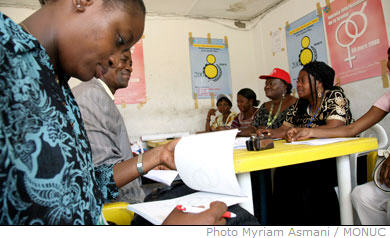A morning of discussion under the theme "the independence of women in the media, their assets, limits and way forward" was organised by the Association of Women Journalists (AJPF) in Kinshasa on 8 April 2008. The meeting was attended by AJPF members and a representative from MONUC’s Gender Office. 
AJPF president Jacqueline Mulanga recounted what was said at the MONUC conference workshop on 7 March last, in celebration of the International Woman’s Day.
She outlined the speech of UN Secretary General Ban Ki-moon, who incited women to mobilise themselves for the promotion of gender equality and the emancipation of women.
“Gender equality is not only an aim in itself, it is an indispensable condition to achieve all the other international development objectives, including the Millennium Development Goals,” she said.
AJPF General Secretary Beatrice Makaya stressed the assets, limits and constraints which female journalists face in the Democratic Republic of Congo.
Ms. Makaya emphasised the talents of some pioneering journalists, who showed much competence despite never attending journalism school. She added that this competence was recognized by the large journalism schools.
One of the AJPF’s programme priorities was in information technology, said Ms. Makaya, as many female journalists lacked skills in this field.
But Ms. Makaya added that female Congolese journalists in many newspapers and television channels were women who “manage human resources issues with tact.”
However vis-à-vis these assets, the talents of the women are slowed down by limits and constraints, such as poverty, habits and prejudices within Congolese media and society, as well as Congolese law itself.
Charlotte Ngungi of MONUC’s Gender Affairs Division gave a report on the weak representation of the woman in seats of power in the DRC. There are 42 women out of 500 deputies in the National Assembly; 5 women out of 108 senators; 43 women out of 690 provincial deputies; 1 woman out of 22 elected provincial governors and vice governors; and at the central government there are 5 women out of the total 42 members.
To rectify this, Ms. Ngungi proposed that the woman journalists should give more focus to gender issues. “It is necessary to arouse the interest and to analyse the problems under the gender issue,” she said.
She reiterated the engagement of MONUC to help Congolese media professionals so that they have the necessary tools, but said that “we are not a finance or development institute, but we can give you advice on the matter.”
The AJPF, created in 1981, has 72 members, of which 32 are in Kinshasa with the other members based in the provinces of Katanga, Bas Congo and Bandundu.
The association had only women members until the year 2000, but it evolved to fulfill the gender issue, and today it has six men, of which one is vice president and the other is Assistant General Secretary .
Related articles
- • Moise Katumbi blocked from entering DR Congo (August 3, 2018)
- • At least 60 killed as train derails in Katanga province (April 23, 2014)
- • Thousands of Women March Against M23 Rebels in Kinshasa (November 24, 2012)
- • Opposition Supporters Step Up Attacks on Congolese Officials Abroad (February 28, 2012)
- • Kabila's Senior Advisor Katumba Mwanke Dies in Plane Crash (February 12, 2012)
- • Tshisekedi Says He Won, Can He Prove It? (December 17, 2011)
- • Supreme Court Rules Joseph Kabila Won Presidential Election (December 16, 2011)
- • Kabila Leads Partial Election Results (December 3, 2011)
- • Vote Counting Underway after Mostly Peaceful Elections (November 29, 2011)
- • Candidates to Make Last Stand in Kinshasa before Monday's Election (November 26, 2011)
- • Tshisekedi: UDPS Has Never Been for a Joint Opposition Candidacy (November 19, 2011)
- • On the Campaign Trail, Kabila, Tshisekedi Cross Paths in Eastern Congo (November 15, 2011)
- • UN advises prudent use of abundant resources to spur development (October 10, 2011)
- • The Government Will Ensure Peaceful Elections, Says Spokesman (October 6, 2011)
- • 19,497 Candidates to Run for 500 Seats in Parliament (September 26, 2011)
- • Kabila's Election Speech Leads to Judges' Strike (September 20, 2011)
- • Tshisekedi Draws Huge Crowds in Kinshasa (August 10, 2011)
- • Security Council extends mandate of UN mission in DR Congo (June 28, 2011)
- • Rights Groups: Strengthen Civilian Protection Before Elections (June 9, 2011)
- • Global Witness welcomes DR Congo's decision to publish resource contracts (June 3, 2011)
- • Militiamen Sent to Testify in Warlords Trials at ICC (March 28, 2011)
- • UN Sanctions FDLR Leaders, CNDP Rebel Commander Integrated into Army (December 2, 2010)
- • UN launches patrols to head off rebel violence during holiday season (December 1, 2010)
- • ICC Dismisses Jean-Pierre Bemba's Appeal on Admissibility of His Case (October 19, 2010)
- • Congo Defense Minister Rejects UN Allegations against Army (October 17, 2010)
- • FDLR leader Callixte Mbarushimana arrested in France on ICC warrant (October 11, 2010)
- • Rebel leader presumed responsible for mass rape arrested (October 5, 2010)
- • UN DR Congo Report Exposes Grave Crimes (October 1, 2010)
- • TP Mazembe boss fumes over ban (September 14, 2010)
- • TP Mazembe boss oozes confidence (September 9, 2010)
Tags: |







